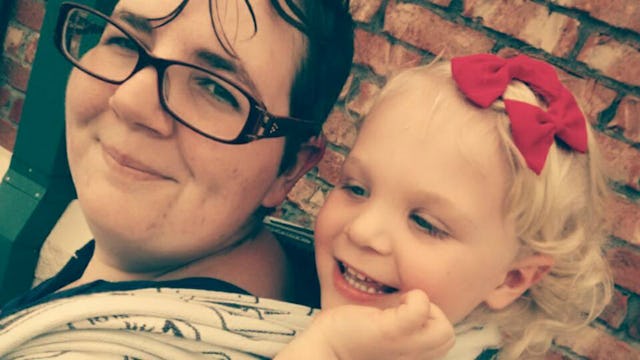Becoming A Parent Helped Me Understand That I Am Transgender

Being a parent is weird. I spend an inordinate of time cleaning sticky stuff off my furniture and saying things like, “Don’t poke your brother’s penis with that fork!” At the same time, though, what’s even weirder than the melted play-dough stuck to my couch is the way these three tiny humans have made me reexamine everything about myself.
I didn’t see myself clearly until I had my second child. Never mind that I spent the first three years of my relationship talking to my partner about my discomfort with my body. Never mind that while we have always told our kids and everyone else that they have two moms, I have never let them call me mother.
Never mind all of that because I was an adult. I was the best and possibly the only Nova the world had ever seen (totally normal to have your kids call you something derived from the planet-destroying alien in Final Fantasy VII? Right?). I had kids, and having two moms in Alabama was hard enough on them. I couldn’t keep asking the question: “But why do I feel like a boy?”
So I didn’t.
Every time that thought rose up, I went out and bought a skirt, or grew my hair long again, or took another awkward stab at makeup or jewelry.
My first child didn’t change that for me. My partner carried her, birthed her, named her — and she is amazing. But I was still holding that mask of woman in front of my face. Never had I felt such dysphoria as when I was pregnant with and then nursing our second child — these acts so uniquely associated with being female. I wanted to do these things, and therefore there must still have been something female about me, right?
So I took a deep breath and did some reading, and I decided I must be gender-fluid. That had to be it, right? I had a few leanings in the masculine direction, but I was still a woman, right?
Sam Dayze
But this kid I birthed is annoying. He insists on being his own person, and this child who laughs with his entire face and body, who shops in the girls’ section because he loves rainbows and unicorns and glitter — he has made me pull out this giant mirror and look at myself. He calls himself a girl about half the time. He runs around the house pretending to be Annie from Little Einsteins, or Elsa, or Amber the Ambulance. And when he tells me he’s a girl, I say, “Well, darling, you are one of the most wonderful little girls I have ever known.” And I say “she” until he tells me he’s a boy again.
Sam Dayze
I love this child fiercely, and fiercely I will protect his right to be exactly who he, or she, is. There is nothing wrong with him. He is a perfectly irritating little beast who dumps the entire box of cereal on the floor faster than I can grab it from him, flaps his arms like a bird when he gets excited, and sometimes feels so deeply that he’s a girl that he just can’t contain it and has to shout it joyously from the car window. Maybe it will become more consistent and will persist, and maybe it won’t. Either way, this child of mine — whether he, she, or they — is perfect and perfectly human.
And if my child is perfect, how can there be something wrong with me? So I dropped the feminine parts of my name. I cut off all my hair again. I stopped making even a token effort at dressing like a woman. I’ve told friends and built a support system and started trying out those shiny he/him pronouns I so adore. Baby steps to being me for the first time — because of this child who wears my partner’s lipstick and keeps his long blonde curls in a pink ponytail.
I carried this child within me. I birthed him. I still nurse him, and I am male. And that’s okay. Because of what my child has taught me, I no longer pretend to be someone’s mother. And that is both wonderful and very, very scary.